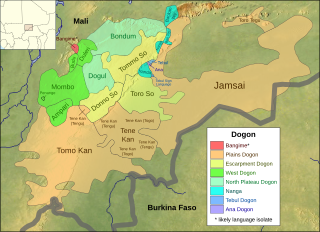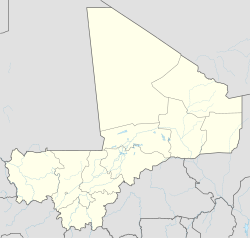
Back Idioma bangime AST Idioma bangime Spanish Bangime French Harshen Bangime Hausa バンギメ語 Japanese 방기메어 Korean Język bangime Polish Lenga Dogon, Bangeri Me PMS Бангери Russian Gjuha Bengime Albanian
| Bangime | |
|---|---|
| Baŋgɛri-mɛ | |
| Native to | Mali |
| Region | Dogon cliffs |
Native speakers | 3,500 (2017)[1] |
| Language codes | |
| ISO 639-3 | dba |
| Glottolog | bang1363 |
| ELP | Bangime |
 Bangi-me, among the Dogon languages | |
| Coordinates: 14°49′N 3°46′W / 14.81°N 3.77°W | |
Bangime (/ˌbæŋɡiˈmeɪ/; bàŋɡí–mɛ̀, or, in full, Bàŋgɛ́rí-mɛ̀)[2] is a language isolate spoken by 3,500[1] ethnic Dogon in seven villages in southern Mali, who call themselves the bàŋɡá–ndɛ̀ ("hidden people").[citation needed] Bangande is the name of the ethnicity of this community and their population grows at a rate of 2.5% per year.[3] The Bangande consider themselves to be Dogon, but other Dogon people insist they are not.[4] Bangime is an endangered language classified as 6a - Vigorous by Ethnologue.[5] Long known to be highly divergent from the (other) Dogon languages, it was first proposed as a possible isolate by Blench (2005). Heath and Hantgan have hypothesized that the cliffs surrounding the Bangande valley provided isolation of the language as well as safety for Bangande people.[6] Even though Bangime is not closely related to Dogon languages, the Bangande still consider their language to be Dogon.[4] Hantgan and List report that Bangime speakers seem unaware that it is not mutually intelligible with any Dogon language.[7]
Roger Blench, who discovered the language was not a Dogon language, notes,
- This language contains some Niger–Congo roots but is lexically very remote from all other languages in West Africa. It is presumably the last remaining representative of the languages spoken prior to the expansion of the Dogon proper,
which he dates to 3,000–4,000 years ago.[citation needed]
Bangime has been characterised as an anti-language, i.e., a language that serves to prevent its speakers from being understood by outsiders, possibly associated with the Bangande villages having been a refuge for escapees from slave caravans.[7]
Blench (2015) speculates that Bangime and Dogon languages have a substratum from a "missing" branch of Nilo-Saharan that had split off relatively early from Proto-Nilo-Saharan, and tentatively calls that branch "Plateau".[8]
- ^ a b Heath & Hantgan 2018, p. 3.
- ^ Hantgan 2010.
- ^ Heath & Hantgan 2018, p. 1-3.
- ^ a b Hantgan 2013b.
- ^ "Bangime". Ethnologue. Retrieved 2019-03-22.
- ^ Heath & Hantgan 2018, p. 5.
- ^ a b Hantgan & List 2018.
- ^ Blench 2015.
© MMXXIII Rich X Search. We shall prevail. All rights reserved. Rich X Search
